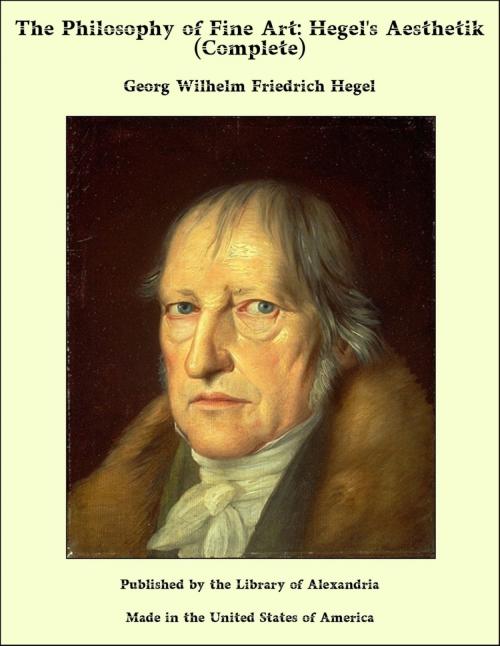The Philosophy of Fine Art: Hegel's Aesthetik (Complete)
Nonfiction, Religion & Spirituality, New Age, History, Fiction & Literature| Author: | Georg Wilhelm Friedrich Hegel | ISBN: | 9781465617392 |
| Publisher: | Library of Alexandria | Publication: | March 8, 2015 |
| Imprint: | Language: | English |
| Author: | Georg Wilhelm Friedrich Hegel |
| ISBN: | 9781465617392 |
| Publisher: | Library of Alexandria |
| Publication: | March 8, 2015 |
| Imprint: | |
| Language: | English |
For a subject-matter such as this the term "Aesthetic" is no doubt not entirely appropriate, for "Aesthetic" denotes more accurately the science of the senses or emotion. It came by its origins as a science, or rather as something that to start with purported to be a branch of philosophy, during the period of the school of Wolff, in other words when works of art were generally regarded in Germany with reference to the feelings they were calculated to evoke, as, for example, the feelings of pleasure, admiration, fear, pity, and so forth. It is owing to the unsuitability or, more strictly speaking, the superficiality of this term that the attempt has been made by some to apply the name "Callistic" to this science. Yet this also is clearly insufficient inasmuch as the science here referred to does not investigate beauty in its general signification, but the beauty of art pure and simple. For this reason we shall accommodate ourselves to the term Aesthetic, all the more so as the mere question of nomenclature is for ourselves a matter of indifference. It has as such been provisionally accepted in ordinary speech, and we cannot do better than retain it. The term, however, which fully expresses our science is "Philosophy of Art," and, with still more precision, "Philosophy of Fine Art." (a) In virtue of this expression we at once exclude the beauty of Nature from the scientific exposition of Fine Art. Such a limitation of our subject may very well appear from a certain point of view as an arbitrary boundary line, similar to that which every science is entitled to fix in the demarcation of its subject-matter. We must not, however, understand the limitation of "Aesthetic" to the beauty of art in this sense. We are accustomed, no doubt, in ordinary life to speak of a beautiful colour, a beautiful heaven, a beautiful stream, to say nothing of beautiful flowers, animals, and, above all, of beautiful human beings. Without entering now into the disputed question how far the quality of beauty can justly be predicated of such objects, and consequently the beauty of Nature comes generally into competition with that of art, we are justified in maintaining categorically that the beauty of art stands higher than Nature. For the beauty of art is a beauty begotten, a new birth of mind; and to the extent that Spirit and its creations stand higher than Nature and its phenomena, to that extent the beauty of art is more exalted than the beauty of Nature. Indeed, if we regard the matter in its formal aspect, that is to say, according to the way it is there, any chance fancy that passes through any one's head, is of higher rank than any product of Nature. For in every case intellectual conception and freedom are inseparable from such a conceit. In respect to contentthe sun appears to us an absolutely necessary constituent of actual fact, while the perverse fancy passes away as something accidental and evanescent. None the less in its own independent being a natural existence such as the sun possesses no power of self-differentiation; it is neither essentially free nor self-aware; and, if we regard it in its necessary cohesion with other things, we do not regard it independently for its own sake, and consequently not as beautiful.
For a subject-matter such as this the term "Aesthetic" is no doubt not entirely appropriate, for "Aesthetic" denotes more accurately the science of the senses or emotion. It came by its origins as a science, or rather as something that to start with purported to be a branch of philosophy, during the period of the school of Wolff, in other words when works of art were generally regarded in Germany with reference to the feelings they were calculated to evoke, as, for example, the feelings of pleasure, admiration, fear, pity, and so forth. It is owing to the unsuitability or, more strictly speaking, the superficiality of this term that the attempt has been made by some to apply the name "Callistic" to this science. Yet this also is clearly insufficient inasmuch as the science here referred to does not investigate beauty in its general signification, but the beauty of art pure and simple. For this reason we shall accommodate ourselves to the term Aesthetic, all the more so as the mere question of nomenclature is for ourselves a matter of indifference. It has as such been provisionally accepted in ordinary speech, and we cannot do better than retain it. The term, however, which fully expresses our science is "Philosophy of Art," and, with still more precision, "Philosophy of Fine Art." (a) In virtue of this expression we at once exclude the beauty of Nature from the scientific exposition of Fine Art. Such a limitation of our subject may very well appear from a certain point of view as an arbitrary boundary line, similar to that which every science is entitled to fix in the demarcation of its subject-matter. We must not, however, understand the limitation of "Aesthetic" to the beauty of art in this sense. We are accustomed, no doubt, in ordinary life to speak of a beautiful colour, a beautiful heaven, a beautiful stream, to say nothing of beautiful flowers, animals, and, above all, of beautiful human beings. Without entering now into the disputed question how far the quality of beauty can justly be predicated of such objects, and consequently the beauty of Nature comes generally into competition with that of art, we are justified in maintaining categorically that the beauty of art stands higher than Nature. For the beauty of art is a beauty begotten, a new birth of mind; and to the extent that Spirit and its creations stand higher than Nature and its phenomena, to that extent the beauty of art is more exalted than the beauty of Nature. Indeed, if we regard the matter in its formal aspect, that is to say, according to the way it is there, any chance fancy that passes through any one's head, is of higher rank than any product of Nature. For in every case intellectual conception and freedom are inseparable from such a conceit. In respect to contentthe sun appears to us an absolutely necessary constituent of actual fact, while the perverse fancy passes away as something accidental and evanescent. None the less in its own independent being a natural existence such as the sun possesses no power of self-differentiation; it is neither essentially free nor self-aware; and, if we regard it in its necessary cohesion with other things, we do not regard it independently for its own sake, and consequently not as beautiful.















